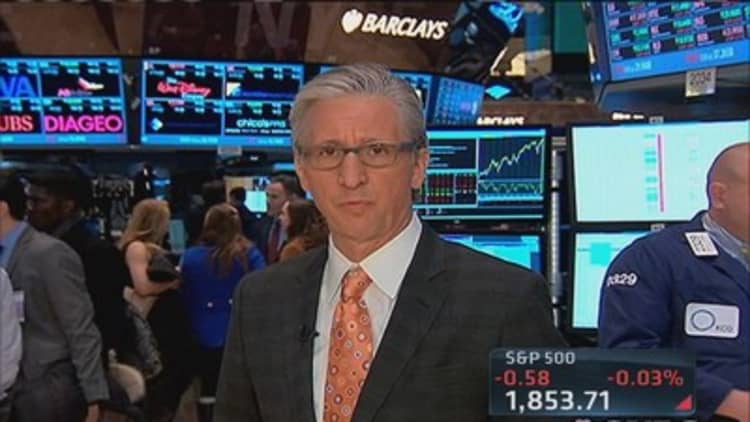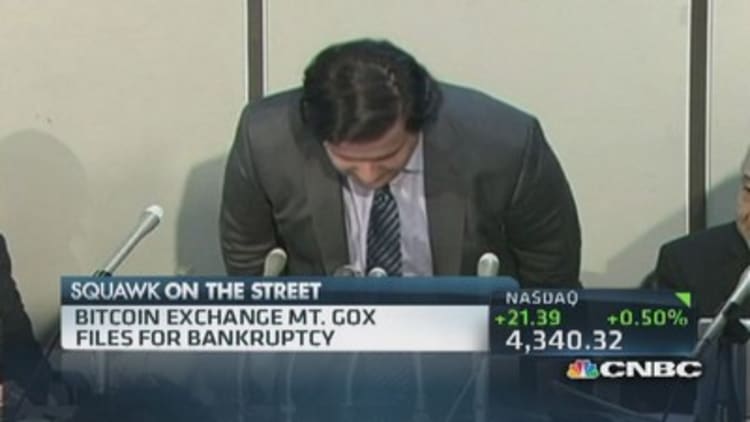
U.S. stocks lost much of their gains on Friday, with the S&P 500 still managing a record close and equities posting a monthly gain.
Rumors about possible Russian action in the Ukraine were cited as a potential factor in stocks pulling back late in the session.
The Wall Street Journal, quoting Russia's Interfax news agency, reported Ukraine's acting president claimed Russia sent troops to Crimea and seized Parliament. This followed unconfirmed reports from the BBC and AFP that Russian troops may have entered Crimea.
"That is something we're watching very carefully; it appears that Russia will take an active role in the Ukraine," said Jim Russell, senior equity strategist at US Bank Wealth Management, who cited the potential for political disruption as well as possible interruptions to natural-gas supplies and "to some degree global oil output."
That said, "we thought the market was a little ahead of itself with the recent momentum; there's a lot riding on the weather being behind all the soft economic data. Today's pullback is a little cautionary in tone, and it's healthy. Now there's a bit of wait-and-see where we are," Russell said.
Equities had rallied amid a slew of economic reports that had consumer sentiment in February coming in just above expectations, existing-home sales holding steady in January and the U.S. economy growing at a slower-than-previously estimated pace in the final quarter of 2013.
"Clearly the weather is having an impact on economic activity, as that marginal shopper is just not out as they would be. We feel we'll get a payback from a cooped up, restraining winter, and we could see healthy numbers in the spring and summer as people get out and enjoy themselves," said Jim Anderson, an investment specialist for JP Morgan Private Bank in Michigan.
Major U.S. Indexes
The Dow Jones Industrial Average rose as much as 126 points, and ended up 49.06 points, or 0.3 percent, at 16,321.71, leaving it up 4 percent for February.
After advancing to an intraday record of 1,867.92, the rose 5.16 points, or 0.3 percent, to 1,859.45, topping the closing record set on Thursday. It gained 4.3 percent for the month.
Apple shares erased initial gains and turned negative as the iPhone maker held its annual shareholder meeting, with investors voting down all proposals put up for a vote.
Investors thought "maybe there would be some new news, but it was basically a non-event involving a company in which there are high expectations," said Peter Boockvar, chief market analyst at the Lindsey Group.
Arena Pharmaceuticals slid after reporting losses widened in the fourth quarter. Jos. A. Bank climbed after the menswear chain rebuffed a $1.78 billion offer from Men's Wearhouse, but said it is willing to talk to its larger rival about a higher bid.
After rising to a 14-year high of 4,342.59, the Nasdaq shed 10.81 points, or 0.3 percent, to 4,308.11, leaving it up 5 percent for the month.
For every two stocks falling, three gained on the New York Stock Exchange, where nearly 960 million shares traded. Composite volume cleared 3.9 billion.

The dollar declined against the currencies of major U.S. trading partners, while the yield on the 10-year Treasury note used in determining mortgage rates and other consumer loans rose 1 basis point to 2.653 percent.
On the New York Mercantile Exchange, crude-oil futures for April delivery rose 19 cents to $102.59 a barrel; gold futures shed $10.20, or 0.8 percent, to $1,321.60 an ounce.
Consumer sentiment rose marginally this month even as concerns about the extreme weather persisted, with the Thomson Reuters/University of Michigan's final read coming in at 81.6, just above the 81.2 in the preliminary estimate and the January reading.
(Read: Consumer sentiment rises, defying cold weather and bad news)
And, the National Association of Realtors reported pending home sales edged up 0.1 percent to 95.0 in January, below estimates for a 2.0 percent gain.
"We've seen a slowdown in housing that is not weather related. Prices have adjusted, so values aren't as widespread as they were, and the investment money that was in housing has come down," said Anderson.
Another data point had a measure of economic activity in the Chicago region topping expectations, with the February Chicago Purchasing Managers' Index at 59.8 versus a 57.0 estimate.
And revised figures from the Commerce Department pegged fourth-quarter expansion at 2.4 percent in the fourth quarter, versus the 3.2 percent gain projected in January. The economy grew 4.1 percent in the third quarter.
On Thursday, U.S. stocks climbed, with the S&P 500 closing at a record, after Federal Reserve Chair Janet Yellen said the Fed would likely continue tapering its asset purchases while tracking data to determine the impact of the harsh winter weather on the economy.
The central bank sticking with its tapering is "the Fed confirming its positive view on markets as the employment rate comes down. If the Fed were to stop tapering you might have a negative effect, what do they see that we don't see," said JP Morgan's Anderson.
JP Morgan expects the Fed will be done with its monthly bond purchases by October, and then the focus will turn to when the central bank raises benchmark rates, but that is "probably a 2015 situation," said Anderson.
—By CNBC's Kate Gibson
More From CNBC.com:


